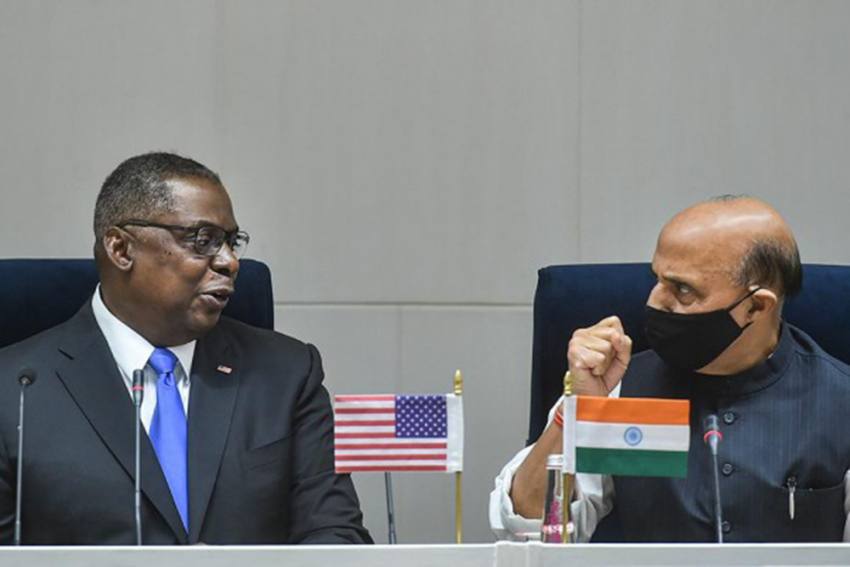
India, US vow to deepen defence cooperation - especially in Indo-Pacific region
At a meeting in New Delhi, the two sides focused on improving defence cooperation, information-sharing in emerging areas, and mutual logistical support

India on Saturday agreed to pursue enhanced defence cooperation with the US Indo-Pacific Command, Central Command and Africa Command.
Defence Minister Rajnath Singh made the announcement after meeting his US counterpart, Secretary of Defense General (Retd) Lloyd Austin, in New Delhi, with the latter describing the partnership as the “central pillar” of America’s Indo-Pacific policy.
The policy is aimed, in part, at deepening US’s engagement with its allies in the Indo-Pacific region and containing China’s territorial expansionist agenda.
Also read: Quad, Afghanistan to figure prominently in US Defense Secy’s India visit
Gen Austin said the India-US defence partnership will “grow” in the coming years. “The relationship is a stronghold of a free and open Indo-Pacific region. PM [Narendra] Modi has stated that India stands for freedom of navigation and freedom of overflight, unimpeded lawful commerce and adherence to international law. This is a resounding affirmation of our shared vision for regional security in the Indo-Pacific.”
“We reviewed the wide gamut of bilateral and multilateral exercises and agreed to pursue enhanced cooperation with the US Indo-Pacific Command, Central Command and Africa Command,” Singh said. “Acknowledging that we have in place the foundational agreements, LEMOA, COMCASA and BECA, we discussed steps to be taken to realise their full potential for mutual benefit.”
LEMOA, or the Logistics Exchange Memorandum of Agreement, signed in 2016, allows both nations’ militaries to use each other’s bases for repair and replenishment of supplies. The Communications Compatibility and Security Agreement (COMCASA), inked in 2018, allows interoperability between the two militaries through the transfer of communication security equipment from the US to India. And BECA (Basic Exchange and Cooperation Agreement), signed in October 2020, grants India real-time access to American geospatial intelligence.
Also read: Elevating US-India defence partnership priority of Biden administration: Austin
“We focused on expanding military-to-military engagement,” Singh said. “We’re determined to realise the full potential of comprehensive global strategic partnership.”
The minister said he had invited the US defence industry to take advantage of India’s liberalised FDI policies in the sector.
Gen Austin reiterated Singh’s words and said his visit was primarily to convey the Biden-Harris administration’s message about the commitment to America’s allies and partners.
He said he “reaffirmed our commitment to a comprehensive and forward-looking defence partnership with India as a central pillar of our approach to the region”.
However, the defense secretary also hinted that India’s planned purchase of a Russian missile system could trigger US sanctions. “We certainly urge all our allies and partners to move away from Russian equipment… and really avoid any kind of acquisitions that would trigger sanctions on our behalf,” Austin said in response to a question about India’s plan to acquire the S-400 missile.
Senator Bob Menendez, the chairman of the Senate Foreign Relations Committee, had urged the Pentagon chief to raise the issue with India. “If India chooses to go forward with its purchase of the S-400, that act will clearly constitute a significant, and therefore sanctionable, transaction with the Russian defense sector,” Menendez wrote in a letter to Gen Austin, referring to the Countering America’s Adversaries Through Sanctions Act.
Gen Austin also said he had a conversation with Indian ministers about the human rights of minorities in India. “We have to remember that India is our partner, a partner whose partnership we value. And I think partners need to be able to have those kinds of discussions. And certainly, we feel comfortable doing that. And you can have those discussions in a very meaningful way and make progress,” he said.
India is the third destination in Gen Austin’s three-nation tour, the first since the Joe Biden administration took charge. The secretary called on Prime Minister Narendra Modi soon after his arrival in New Delhi on Friday. He later held talks with National Security Advisor Ajit Doval.

